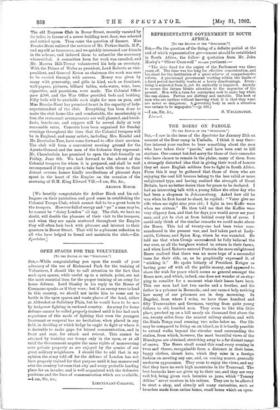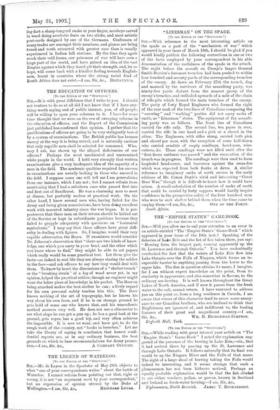THE BOERS ON PAROLE.
[To THE EDITOR OF THE " SPECTATOR."]
saw in the issue of the Spectator for January 25th an account of the Boer camp in Umballa. I think it may there- fore interest your readers to hear something about the men who have taken their " parole," and have been sent to hill stations. One cannot but feel sorry for those of their comrades who have chosen to remain in the plains, many of them from a strangely distorted idea that in giving their word of honour they set more English soldiers free to fight in South Africa. From this it may be gathered that those of them who are enjoying the cool hill breezes belong to the less rabid or more enlightened type, and having realised the strength of Great Britain, have no better desire than for peace to be declared. I had an interesting talk with a young fellow the other day who had been a shopman in Johannesburg. Asked bow old he was when he first learnt to shoot, he replied : " Vater give me rifle when me eight nine year old ; I fight in two Kaffir wars when me sixteen." He then told me that the Kaffirs were very slippery foes, and that for days you would never see your man, and yet be shot at from behind every bit of cover. I could only think of the similar remarks we could make about the Boers. This lad of twenty-one had been twice com- mandeered in the present war, and had taken part at Lady- smith, Colenso, and Spion Bop, where he was wounded. He told me that when Cronje surrendered he fully believed the war over, as all the burghers wished to return to their farms, and when Lord Roberts entered Pretoria the more enlightened Boers realised that there was no more hope of a successful issue for their side, or, as be graphically expressed it, of " sticking it." He spoke bitterly of President Kriiger as having gone off with all the public money, and appeared to share the wish for peace which seems so general amongst the Boers now, and which, indeed, one does not wonder at on stop- ping to consider for a moment what their losses have been. This one man had lost two uncles and a brother, and his father is a prisoner in Bermuda; and one cannot help noticing how many of our prisoners are in deep mourning. In Dagsbai, from where I write, we have three hundred and fifty Transvaalers and Germans, varying from quite young fellows to old, bearded men. They seem to like this little place, perched up on a hill nearly six thousand feet above the sea, twenty miles from the nearest railway station, and with the Simla Tonga road running two miles below us. Our life may be compared to living on an island, as it is hardly possible to extend walks beyond the circular road surrounding the station, from which, however, the most beautiful views of the Himalayas are obtained, stretching away to a far distant range of snows. The Boers stroll round this road every evening in twos and threes, recognisable from a distance in their loose, baggy clothes, slouch hats, which they raise in a foreign fashion on meeting any one, and, on coming nearer, generally unshaven appearance. They seem to enjoy the views, and say that they have no such high mountains in the Transvaal. The best barracks here are given up to their use, and they are very well fed, being given such luxuries as jams, which "Tommy Atkins" never receives in his rations. They are to be allowed to start a shop, and already sell many curiosities, such as brooches made from ration bones, small boxes which on open- ing dart a sharp-tongued snake at your finger, monkeys carved in wood doing acrobatic feats on two sticks, and most artistic post-cards designed by one of the Germans. Craftsmen of many trades are amongst their numbers; and pianos are being tuned and teeth extracted with greater ease than is usually experienced in Indian hill stations. By the time they again reach their veld farms, our prisoners of war will have seen a large part of the world, and have gained an idea of the vast Empire against which they dared pit their strength, and, let us hope, will come back with a kindlier feeling towards English- men, learnt in countries where the strong racial feud of South Africa does not exist.—I am, Sir, &c., BRITANNICA.











































 Previous page
Previous page